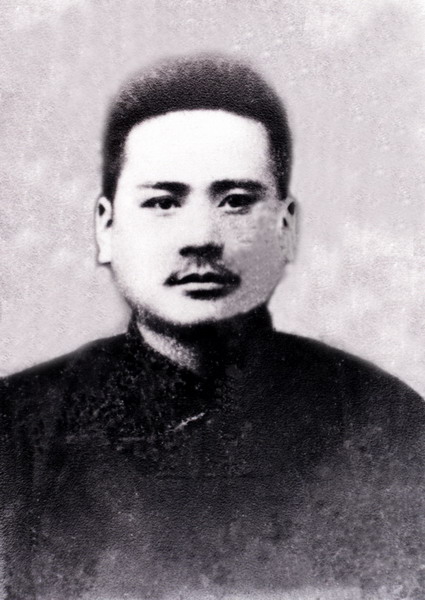Yang Yin

Yang Yin was a special one of the revolutionary followers of Sun Yat-sen in Cuiheng Village. He not only took part in the revolutionary movement led by Sun Yat-sen, but also was a famous workers' movement leader and an early leader of the CPC.
Yang, also known as Guan’en or Dianle, was born in a rich gentry family in Cuiheng Village on August 12, 1892. He received private school education in his childhood, and later received secondary education in Shiqi and Guangzhou.
Yang heard of the stories of his fellow townsmen Sun Yat-sen, Lu Haodong, Yang Xinru, Yang Heling, etc. in his childhood. In early 1911, 19-year-old Yang joined the Chinese Revolutionary League, and transmitted military intelligence and transported armaments secretly to and from Guangzhou, Hong Kong, Macao, Zhongshan, etc. as directed by Sun Mei, Deputy Head of the South Branch of the Chinese Revolutionary League, and Sun Yat-sen’s elder brother.
After the foundation of Republican China, Yang still supported Sun Yat-sen’s revolutionary movement actively. In 1913, when Sun Yat-sen initiated the Second Revolution against Yuan Shikai who attempted to restore a monarchy, Yang supported the revolution actively, and once injured Yuan Shikai’s trusted subordinate, Shanghai Commander Zheng Rucheng with a bomb. In 1917, when Sun Yat-sen established a political power in Guangzhou, Yang worked at the Military Staff of the Generalissimo Mansion. Yang was proficient in martial arts, and often served as a guard of Sun Yat-sen. In May 1918, when Sun Yat-sen was forced to resign by the southwestern warlords and went to Shanghai, Yang was transferred to the Salt Inspection Office in Xiguan, Guangzhou.
The upsand downsof revolution caused him to think about the revolutionary prospect deeply. He saw a hope from the victory of the October Revolution in Russia. At the end of 1922, he joined the CPC through referral by Liang Furan and Yang Zhangfu, and then resigned from the Salt Inspection Office todevote to the revolutionary cause. He initiated workers' movements and established grass-root CPC organizations at Shijing Munitions Factory in Guangzhou, the Yuehan Railway, the Guangjiu Railway, the Guangsan Railway, etc. In 1925, Yang and Tan Pingshan attended the fourth CPC national congress in Shanghai as Guangdong deputies, and introduced the workers' movements in Guangdong and Hong Kong, and the experience and lessons in the cooperation between the Chinese Nationalist Party and the CPC to the deputies. In June of the same year, when the Guangdong-Hong Kong Strike broke out, Yang and Yang Pao’an were responsible for leading strikes in Hong Kong, involving 250,000 workers in total. In May 1927, he served concurrently as Chairman of the Guangdong Counter-revolutionary Elimination Committee. In October, he led the Military Committee and the Counter-revolutionary Elimination Committee of the South China Bureau of the CPC Central Committee, and was a member of the provincial CPC committee. In December 1927, he initiated and led the Guangzhou Uprising of national influence, and served as Acting Chairman of the Guangzhou Soviet People’s Counter-revolutionary Elimination Committee and that of the Soviet People’s Committee during the Guangzhou Soviet Government period. Yang had extensive friends, including left-wing and right-wing members of the Chinese Nationalist Party, the Lun Yee Association, Chinese Freemasons and other associations, and even outlaws, so many organizations invited him to solve troubles for them.
As recalled by Yang’s daughter Yang Ailan, Cuiheng villagers Yang Biao, Yang Wenying, Yang Wenzhu, Lu Jinheng, Yang Boming, Yang Ruizhi, Yang Gao, etc. had contributed to Yang’s revolutionary cause, and some of them even became underground CPC members. In 1928, Yang Ailan who was studying became liaison men, and often carried a rattan-made bagand communicated intelligence between Hong Kong and Macao as directed by his father.
In June 1928, Yang went to Moscow to attend the sixth CPC national congress, and was elected as a member of the CPC Central Committee, a candidate member of the Political Bureau of the CPC Central Committee and its standing committee, and Head of the Central Military Department. In November of the same year, he served as an executive member of the Political Bureau of the CPC Central Committee.
On August 24, 1929, he was arrested together with his companions Peng Pai, Yan Changyi, Xing Shizhen and Zhang Jichun due to a traitor, and remained unyielding despite of intimidation and inducement. On August 30, Peng Pai, Yan Changyi, Xing Shizhen and he were killed secretly by the reactionaries of the Chinese Nationalist Party in Longhua, Shanghai, when he was 37 years old. Before the execution, Yang told his companions calmly, “I have no pity because I know the truth!” This showed a communist fighter’s boldness and heroism. Yang and Peng Pai were called the two superstars of workers and farmers of the Chinese revolutionary movement.

